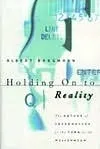Holding On to Reality: The Nature of Information at the Turn of the Millennium
By (author): "Albert Borgmann"
Publish Date:
1999

AsinHolding On to Reality: The Nature of Information at the Turn of the Millennium
Original titleHolding On to Reality: The Nature of Information at the Turn of the Millennium
It's remarkable how far we've traveled into the Information Age without coming up with a very good idea of what information actually is. Technologists define information as bits and bytes, but that seems too precise somehow to get at the heart of the idea. Everyday speech defines it as just about any interesting piece of news, but that seems equally vague. Holding On to Reality is a philosopher's ruminative attempt to find the sweet spot between those two understandings, feeling for an idea of information that does justice both to its deep roots in human history and its broad implications for human culture at the edge of the 21st century. For Borgmann, information is defined as much by the mind and cultural context of the people who behold it as by the physical traces (notches on a bone, voltages on a wire) that embody it. Fleshing out that notion, he tracks the changing nature of information across the face of history--from the natural signs that mattered most to prehistoric people to the alphabets and maps that shaped ancient and medieval culture to the mechanically logical forms of information that began to emerge in modern times. Borgmann's observations suffer somewhat when he turns his sights on present-day information technologies and the cultural changes they have wrought. His cultural conservatism shows most strongly here and, at times, comes out sounding more cranky than critical. But on the whole, his insights are supple and thought-provoking. If we are ever going to really understand where the Information Age has come from and what it's about, we'll need more books like this one. --Julian Dibbell